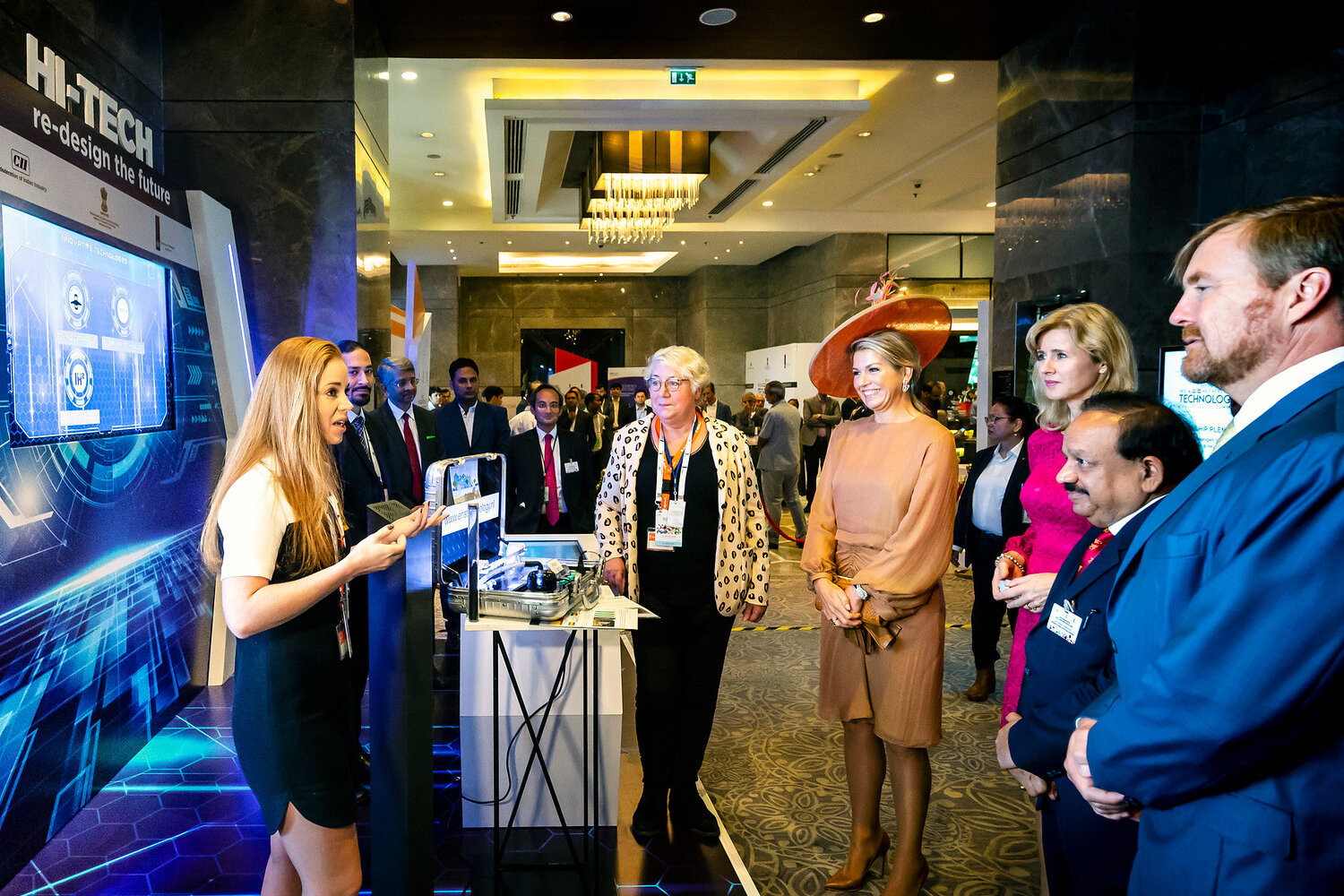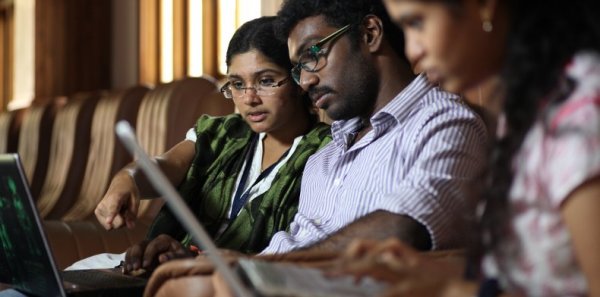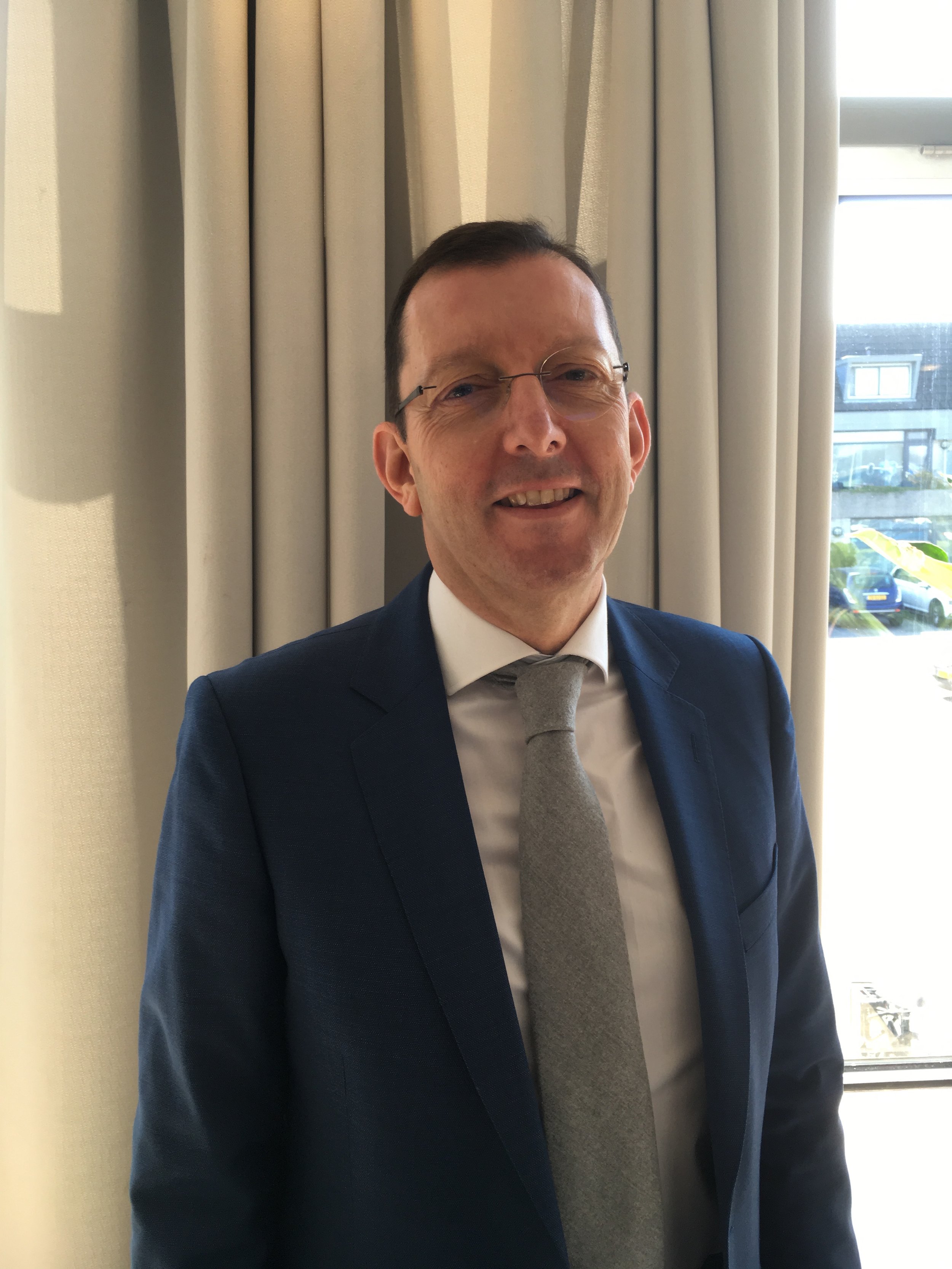ENS Clean Air from Brabant and artist Daan Roosegaarde jointly developed a so-called smog tower, which removes fine dust from the air. After the success in China, requests from India flooded in, but market entry was difficult. "You need to be in it for the long haul in India," says Esmée van de Vorle, managing director of ENS Clean Air.
Managing Director Esmée van de Vorle pitch ENS Clean Air's air purification technology during the trade mission in India
First steps in India
The first contacts with India did not turn out as the Brabant family business ENS Clean Air had hoped. "We have an interesting technology for countries that struggle with poor air quality," says Esmée. "Not surprisingly, soon after we were founded in 2009 we were approached by a potential Indian partner. I flew back and forth with my mother, the founder of ENS, several times to see if we could actually set up a joint venture with this potential partner. It just didn't seem like we could keep full ownership of our technology and that closed the door on us right away. Our goal is clean air for everyone, but this way it didn't feel right." After this experience, India disappears from ENS's sights for a while. Until Esmée got talking to a local engineer at a trade fair in Germany. He wanted to link the company from Brabant to the European Business and Technology Centre in Delhi, because he thought that India could make good use of ENS's technology. "We seized the opportunity. Perhaps with the help of European experts on the ground we could find the right partner."
The applications from India are rolling in
While the Brabant family business is working with the EBTC to find a suitable business partner in India, artist Daan Roosegaarde is simultaneously starting his world tour with the Smog Free Tower. "That's a design tower incorporating our air purification technology," Van de Vorle explains. "That exposure suddenly got the whole world interested in us. One of the interested parties was the Dutch Embassy in Delhi, which is keen to help ENS gain a foothold in India. "And then it all goes really fast," says Esmée. "Through the EBTC we met a suitable partner with whom it clicked well, and through our contact with the Dutch embassy we not only got an assignment from The American Embassy School to improve the air quality in their courtyard, but also a last minute spot in the trade mission in India led by Prime Minister Rutte."
Don't shy away from pitching at a children's party
A trade mission is hard work
"Trade missions are mainly a very nice way to make contacts and to get exposure for your business," explains Esmée. "So don't expect to come home after your participation with all the hard deals under your arm. Especially not in a country like India where building a relationship of trust between trading partners is ten times as important." According to Esmée, making good contacts is therefore one of the most important lessons she learned about business from her mother and would also like to pass on to other entrepreneurs. "You are on a business trip to work, so you just have to show your face everywhere. Not just at business events and meetings, you have to be on 24/7."
Pitching at a child's birthday
"If you get the chance to meet in private, make sure you take it," is Esmée's advice. "During the trade mission with Rutte I met our new business partner, whom EBTC had found for us, in person for the first time. That went very well and so they invited us to the birthday of the owner's niece. That birthday fell exactly on our last day in India, three hours before the flight back to the Netherlands. My colleague therefore doubted whether it was wise to go, but I knew we couldn't miss out. Once at the party, we were introduced to one senior official after another, all very interested in our company. So on the last day of the trip I was pitching at a children's birthday party to about twenty high-ranking officials."
Firm agreements on quality
ENS and their Indian partner, Sudhir Power, have now successfully completed their first major job at The American Embassy School in New Delhi. "This job allowed us to test our newly formed partnership. We only had technical supervision on site and gave our partner Sudhir Power the freedom to do the installation work in their own way." Despite the fact that, according to Esmée, in such a partnership you have to dare to surrender a little to your new partner's way of doing things, she still advises companies to make clear agreements on manufacturing methods. "For example, we have agreed that we will produce the control cabinets in the Netherlands and the rest of the components, such as the housing, will be made in India. We do have strict requirements for this, so that we can be sure of guaranteeing the quality of our product. Fortunately, we have found a partner who has been working with European companies for a long time. They understand very well what quality the products have to be."
Benefits of corona crisis
With the outbreak of the coronavirus, the cooperation between ENS and Sudhir has temporarily slowed down. "Not because things are not going well between us", says Esmée, "but because we agreed from the start that we would build up the cooperation slowly. First we'd date, then we'd get engaged, and whether we'd actually get married or set up a joint venture is something we'll see in due course." But the big impact COVID-19 is having on India could create some interesting opportunities for ENS's products in the near future. "We are still a niche product, but as air purification is an important weapon in the fight against airborne viruses, more attention is being paid to our technology. That could well pay off for us in the future.
Bureaucratic hurdles
For the time being, ENS is mainly suffering from the strict measures that the Indian government has taken to curb the spread of the coronavirus. After installing the purification systems in the courtyard of The American Embassy School, ENS also had special measuring equipment installed to show how effective the systems work. "And then suddenly the whole country went on lockdown and we were suddenly unable to remove that equipment, which we had introduced with a special visa, in time for the permit to expire," says the management director of ENS. "I thought I had done the right thing by asking the Indian Chamber of Commerce for advice. But now they have sent me from pillar to post and there is a claim on our equipment. We are now getting help from Maier+Vidorno, IndiaConnected's partner in India, and hope to convince the customs authorities to let us recover the equipment. If not, this will become a legal case. I am thus learning a hard lesson about bureaucracy in India."
Family business
Despite this setback, for Esmée India is above all a place where you are received with a warm smile and genuine interest. "Especially the fact that we are a family business opens doors for us. Our Indian partner, for example, is also a real family business and that not only evokes recognition, but also creates a better bond of trust. We are very happy with this cooperation. Esmée is looking forward to working with Sudhir Power in the coming years to gradually build a cleaner living environment in India. "For example by helping more schools to turn their squares into safe playgrounds or to improve the situation in the Indian streets a little by further implementing our Lungs of the City concept. Hopefully, in the longer term, we will also see the first smog towers rising in Indian cities."



